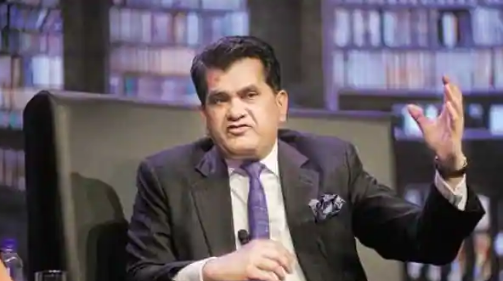60-80% government funding for public-private medical colleges: Amitabh Kant
60-80% government funding for public-private medical colleges: Amitabh Kanton Apr 29, 2021

The idea is to rope in private investors who will access the land available at the existing hospital to set up the college and run it efficiently under an arrangement with the government to improve health education at district levels.
The liberal funding terms come at a time India has turned out to be a global hotspot of coronavirus infections and is grappling with infrastructure constraints. The intention for setting up medical colleges in existing district hospitals was revealed by finance minister Nirmala Sitharaman in her FY21 budget speech in which she indicated that details of the scheme will be worked out in due course.
The move will complement other efforts in the health sector like offering cashless health insurance cover to 500 million people, offering incentives for setting up factories to produce medical devices and drugs, all of which Kant said were key to sustainable development.
“You could combine these (existing district hospitals) with private sector to build medical colleges and we (have) built up the viability funding gap for that. You can go upto 60% of the support which can come from the government and in a few cases, it can go upto 80% also. That is really the future of health infrastructure through public private partnership using viability gap funding of the government, said Kant. Referring to production linked incentives offered to medical device manufacturing, Kant said that investors have a huge opportunity in the healthcare segment.
“Other than the infrastructure sector, health is a key sector and there is a huge (investment) opportunity…Health sector infrastructure is key to long term sustainable growth. If you want to grow at high rates of 9-10% over a long period of time, then health and education will be very critical. Nutrition, education and health hold the key for long term sustained growth of India, said Kant.
Kant also indicated India will be bullish on clean energy and in making green products that will help India and other nations to decarbonise their economies. There is a need to offer production linked incentives for manufacturing electrolizers, the device used to make clean fuel hydrogen, as part of efforts to decarbonising the economy and boosting local manufacturing and exports, said Kant.
Kant said that despite the impact of the pandemic, India’s macroeconomic fundamentals remain sound and that reforms were made across key sectors for sustained strong growth. “We need to get over the hump of the Covid crisis and then we should accelerate our growth, said Kant.
In India’s energy basket, electricity accounts for only 17% and the rest accounts for coal, gas and oil. Decarbonising the 83% of energy source is important. Green hydrogen—produced by splitting water using clean energy sources like wind or solar power—offers the opportunity for India to be a global champion in this segment, he said.
“If we are able to do this, we can export green hydrogen. That also gives us the opportunity to manufacture electrolizers, a $20 billion global market. If you have to push for it, you will have to push for production linked incentives. The future of the world across several sectors including city to city transportation and commercial vehicles will all be driven by hydrogen. India must take the lead in that, explained Kant.
This comes in the backdrop of the proposed National Hydrogen Energy Mission, which may mandate fertilizer, steel and petrochemicals industries to shift to green hydrogen.
Source: Livemint
aAmitabh Kant
Coronavirus
Frontlist
Frontlist Latest news
Frontlist News
frontlistb
green hydrogen
medical college
Niti Aayog
private investors



.jpg)






.jpg)

.jpg)
.jpg)
.jpg)
.jpg)
.jpg)










Sorry! No comment found for this post.